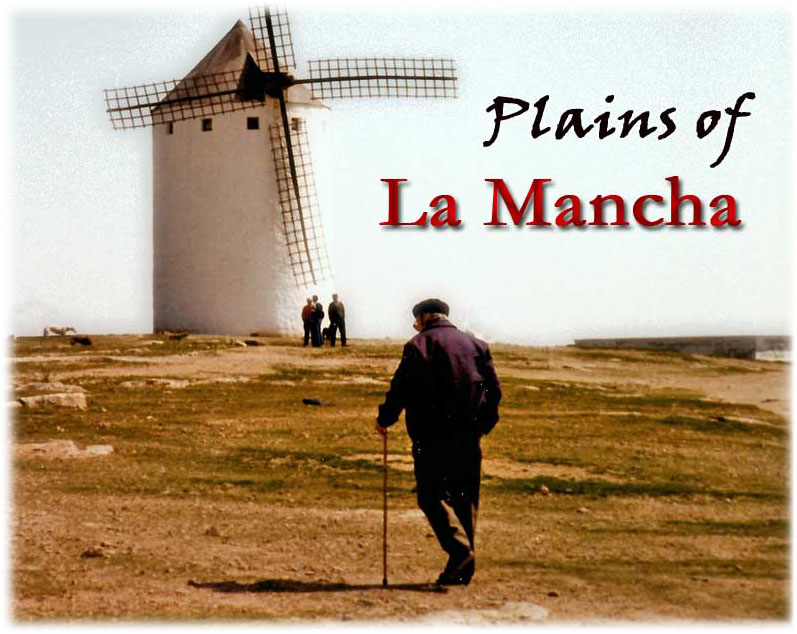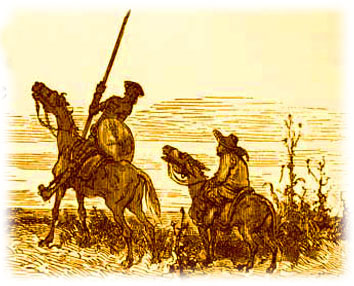Las Llanuras de la Mancha:
Remember me
The last words of a dying man,
we remember the most —
![]()
[2col1]WHETHER or not these brief conversations between Don Quixote and his squire, Sancho Panza, ever took place, we cannot know for certain. What we do know for certain is that if they had said such words, this is what they might have said. The best we can say is that this is fiction, but as Cervantes has shown, fiction is often more poignant than life.
The two companions had been riding for sometime when Don Quixote broke the silence, “I have been thinking about communion and its importance to our very souls. We know that the Lord inaugurated the cup and the bread on the very night he was betrayed. I rather think, Sancho, that what came to be known as the Lord’s Supper was a part of his dying words.”
The remark caught Sancho Panza off guard, much like any unexpected comment might, but he thought he would answer anyway, “A man’s last words should be remembered. His dying make it so. A confession of a dying man is generally considered by law to be true. I would think that something similar would have to be true with our Lord. He wanted those nearest to him to remember him.”
“Yes, ” agreed Don Quixote. “The Lord did say, Do this in remembrance of me.”
He sighed and his eyes seemed fixed on some far distant memory in his mind, “I once saw those same words inscribed on a wooden table at church. You might say that the Lord’s Supper is a memorial service, but I rather think there is more to it than that.” And then, as if it were possible to look even further into thought, he continued, “In remembrance of me sounds like something a friend might say to another friend. In Shakespeare’s Hamlet, the ghost pleads with Hamlet— Remember me, remember me.”
I am thy father’s spirit,
Doom’d for a certain term to walk the night,
. . . . . . . . . . . . . . . . . . . . . .
The glow-worm shows the matin to be near,
And ‘gins to pale his uneffectual fire:
Adieu, adieu! Hamlet, remember me. —Act I, Scene v
“Su Merced,” Sancho said with a rather confused look on his face, “I have heard of Shakespeare, but I have enough trouble speaking good Spanish. At times, Cervantes has to correct my grammar. English is very difficult for me. Remember me, Su Merced, when you begin talking about Shakespeare and other things like that.”
“Excuse me, ” apologized Don Quixote with the air of a gentleman. (After all, Don Quixote was a don)— “I was only trying to say that words like remember me reflect a very special and somber occasion. Christ is not yet dead when he says these words, but like the ghost in Hamlet, there is a foreboding sense of loss and the forelorn.”[endcol] [2col2]Looking rather forelorn himself, Sancho adjusted his saddle on his burro, and then spoke rather haltingly as if in deep thought, “I rather, I rather think you are right.
There is a sense of pain in those words. If we should read the words of the Lord only like an announcement or proclamation, we might miss the point. I mean,” he added,” at times in my village, a messenger will come just to make a public announcement. Of course, what he says is important; otherwise, he would not be there. I live in my village and that is why I go there, but a messenger has to have a better reason than that.
I remember when the messenger told us that the king had died. This was very important news, but the words of the messenger are never thought of as the intimate words of a dying friend.” Sancho stopped and adjusted his saddle again. The two companions had been riding for hours, “In my own case, I well remember the words of my mother as she lay dying. All of us came near to her bed, and she spoke to each of us. It has been many years, but I do not think I will ever forget what she told me.”
“What did she say to you, Sancho?” asked Don Quixote. ” What did she say? Why are you crying now? It has been many years.”
“Forgive me, Su Merced,” objected Sancho, “But you seem almost eager for gossip. I cannot tell you what she said. Her words were only for me. She asked that I never tell anyone.”
“Yes, I see your point, added Don Quixote, but the afternoon was long and the ride had been equally long, so he continued pressing Sancho with false reasons, “Since we are close friends, maybe you could. . . .
“We are close friends,” admitted Sancho, “but all of us have only one mother. Besides, I promised her with an oath. There are other people who are reading our words right now. So, our conversation is not really private. We have to be careful what we say to one another. People can read us like an open book. We must remember that, Don Quixote.”
“Yes, yes,” said Don Quixote with a sense of resignation of a man who knows he has been bested in an argument. “It seems to me,” he paused once more and then continued with the same air of a gentlemen in which had spoken earlier, ” It seems to me that we should probably understand the words of the Christ in a similar way, but there is more. The Holy Scripture says it was the night on which he was betrayed. There is something about betrayal that we need to remember as well. The Lord will soon die, but it is the reason that he dies and the manner in which he dies that we should remember as well. There is something very profound, here, Sancho.” He drew a deep breath, but before he could continue, Sancho interrupted.
“Su Merced, I do not wish to sound disloyal, but we are almost at the next village. We need to find an inn for us to eat and a stable for our animals to eat. Let’s talk more about the Lord’s Supper when we and our readers have more time to listen. Besides, I rather think your comparison with Hamlet may be the wrong comparison.”
By then, the two had reached the inn and were beginning to dismount: the noble Don Quixote of la Mancha and his faithful squire, Sancho Panza.[endcol] [clearcol]

